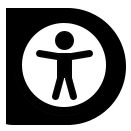This blog tells you about digital accessibility and the resources and events we have to help you. It also highlights Global Accessibility Awareness Day on the 19th of May. This is an important event to help promote good accessible design and practice.
What is digital accessibility?
1 in 5 people in the UK have a disability, this could be visual, hearing, motor, or cognitive (affecting memory and thinking). Over 11% of LJMU students have a declared disability. Digital technology can enable some, but also disable others. The way we make and share electronic resources can impact on how easy it is for people to access them. Some of the practices you may have developed might be making it harder for some people. For instance, the way you create a word document or organise your Canvas course. Making changes will not just help those with disabilities, good design helps everyone. Digital technology can enable some, but also disable others.
Why is it important?
Legislation around the world is changing and forcing companies and public bodies to make sure they follow best practice. In this country, there has always been ‘reasonable adjustment’ making changes to fit individual needs. But this requires the individual to have the confidence and courage to ask. The legislation now requires that we make those changes before the issue arises.
What can you do?
We want to help you to make your digital content as accessible as possible to meet the diverse needs of your students.
- We have some short guides to help you understand this topic and change your practice.
- We are running some training events where you can learn, discuss and share good practice in this area on Global Accessibility Awareness Day (19th of May).
- We are launching an online course to support (coming soon).
Accessibility in Digital Education Design Project (AiDED)
The Teaching and Learning Academy’s AiDED vision is to use the digital learning environment to help all our students improve their life chances. Find out more about accessibility and the AiDED project over on our AiDED Project page.

